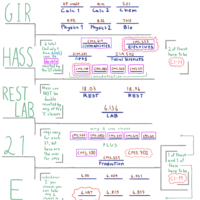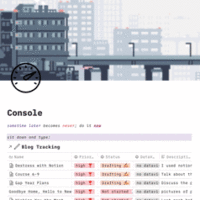During the first year at MIT, you will explore your interests by choosing among a variety of ways to complete core subjects and prepare for further undergraduate study.
Academic exploration
Because all students enroll at MIT “undeclared,” their first year at MIT is typically spent taking some General Institute Requirements (GIRs) while simultaneously exploring their academic (as well as social and residential) interests in order to develop their plans for further study.
Before we get to that, though, it’s worth noting MIT’s forgiving first-year grading system. In the first term, students either pass the class or receive no record of having taken it; in the second term, students earn an A, B, C, or no record. As part of the flexible pass/no record grading option, students may designate up to 48 units to be graded on a pass/no record basis after their first term, and at any time during their course of study.
This grading system is designed to ease the transition from high school by giving students time to adjust to factors like increased workloads and variations in academic preparation. Students are encouraged to improve time-management skills and develop more mature attitudes about learning that focus less on their relative standing against other students01 FYI: there is no class rank at MIT, nor any academic honors conferred upon graduation, so the incentive to compete against other people in your class is pretty much zero. and more about improving their own capabilities and knowledge.
Conventional program
A typical academic program for the first year is centered around completing several GIRs. Students may round out their programs with electives, often including advising seminars or other curricula that help them explore potential majors and minors.
The conventional program is longstanding but, like everything at MIT, an ongoing experiment: in 2018, it was the subject of a design course called Designing the First Year Experience, where students studied complex system design principles and educational theory in order to understand how and why the MIT education works and propose innovations to improve it. The results of this course were studied to help inform future improvements to the MIT education.
Learning communities
As an alternative to simply enrolling in classes, students may instead participate in learning communities built around common interests, dedicated advising, and smaller cohorts.
Concourse
Concourse is a small community of students and faculty dedicated to exploring the fundamental questions at the heart of all serious human inquiry.02 You can kind of think of it as a small liberal arts college experience within your first year at MIT.
Concourse students have close interactions with instructors and fellow students, and benefit from presentations by prominent guest speakers in diverse fields from MIT and elsewhere, as well as a dedicated classroom and lounge.
DesignPlus
DesignPlus is a small community of first-year students who are interested in learning about the design process, connecting with design-oriented peers and faculty, and learning about ways to build design into the rest of their MIT education, regardless of major.
Experimental Study Group
Experimental Study Group (ESG) is a close-knit academic program for 55 motivated first-year students who wish to take an active role in their MIT education. In place of lectures and large classes, ESG students participate in small interactive classes, discussion-based seminars, study groups, and tutorials.
ESG students have a dedicated facility (including a kitchen) where classes are held and weekly activities are offered, such as luncheons and dinners, guest faculty speakers, and evening study sessions.
Terrascope
Terrascope is a learning community where students work on interdisciplinary teams to solve problems related to the Earth’s environment and sustainability.
Fieldwork and close interactions with researchers and others are an important part of the Terrascope experience, and students in the program can choose to participate in a weeklong field trip03 Past locations have included Abu Dhabi, India, California, Costa Rica, and South Africa. over spring break to a site related to the year’s work.
- FYI: there is no class rank at MIT, nor any academic honors conferred upon graduation, so the incentive to compete against other people in your class is pretty much zero. back to text ↑
- You can kind of think of it as a small liberal arts college experience within your first year at MIT. back to text ↑
- Past locations have included Abu Dhabi, India, California, Costa Rica, and South Africa. back to text ↑



